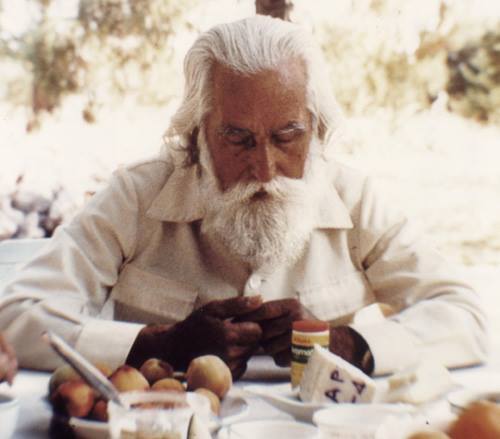What again, is a spiritual master? Omraam Mikhaël Aïvanhov addressed this inevitable question in a talk given in July of 1947. He remarked that it is the truly great masters who rebuild the world by their teaching of love and freedom. He spoke of their power to unleash natural forces to wreak havoc on earth, though their goal is to change individuals and human society through love and patience. He responded to the same question again in greater depth shortly after his return from India.
He then emphasized that in all but one respect a master is like any other human being: A master experiences hunger and thirst and bleeds when cut. What distinguishes a master, however, is the fact that “he has achieved perfect control over himself.”
A master is, first and foremost, a master of his personality. One of his first disciples, Frida Theodosy, recollected how she used to give singing lessons to some of her fellow disciples. One day she arrived early and caught a glimpse of Omraam Mikhaël Aïvanhov sitting at a table in the garden taking lunch with several disciples. The image of her teacher engaged in such a mundane activity as eating startled her, and she quietly reflected on the fact that even a master needs to eat.
A short while later, he went to her room and said to her kindly:
“A Master needs to eat, drink, and sleep just as everyone else does. The difference is that he is in control of his cells, he gives the orders, and his consciousness is much wider, that’s all.”
His down-to-earth remarks were intended to dispel the popular stereotype of great adepts as nearly disembodied beings who sustain themselves on air alone and who feel none of the needs and experience none of the temptations of their fellow humans.
While their inner life is bound to be more rarefied, they are nevertheless still human beings and subject to the promptings of the body-mind. However, their mastery is evident in how they relate to those stirrings. They are masters of self-transcendence, which means they do not succumb to the coarser desires arising within and also seldom yield to subtler manifestations of the ego-personality, such as pride and self-will.
They are truly centered, and the excitements of the body-mind are peripheral to their life. A master knows and obeys the invisible laws and abides by the higher principles of existence. His thoughts, words, and actions are shaped by his spontaneous submission to the Divine. Whether Omraam Mikhaël Aïvanhov talked, walked, smiled, ate, slept, meditated, or engaged in any of the other many functions of a human being, he did so with a fullness and completeness that rendered the ordinary into something extraordinary.
Another article on this topic https://with-omraam.com/recognising-true-spiritual-master/
Extract from The Mystery of Light by Georg Feuerstein
Chapter2. Omraam Mikhaël Aïvanhov: Visionary, Teacher and Healer


Leave A Comment